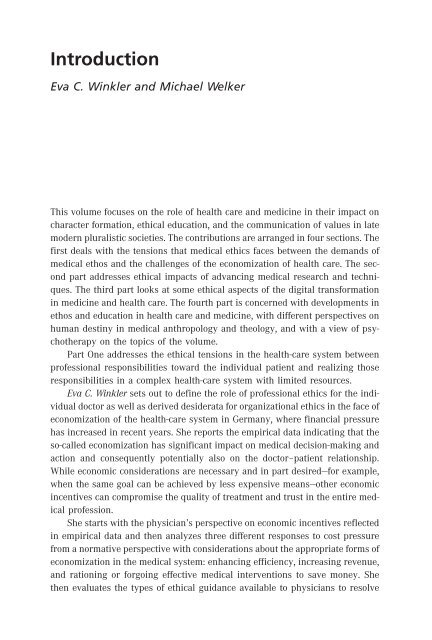Michael Welker | Eva Winkler | John Witte, Jr. | Stephen Pickard (Eds.): The Impact of Health Care (Leseprobe)
Pluralism has become the defining characteristic of many modern societies. Not only a plurality of individual and social claims and activities gain impacts on societal life. A creative pluralism of institutions and their norms profoundly shape our moral commitments and character – notably the family, the market, the media, and systems of law, religion, politics, research, education, health care, and defense. In the theoretical, empirical, and historical contributions to this volume, specialists on medicine, medical ethics, psychology, theology and health care discuss the many challenges that major transformations in their areas of expertise pose to the communication and orientation in late modern pluralistic societies. Contributors come from Germany, the USA and Australia.
Pluralism has become the defining characteristic of many modern societies. Not only a plurality of individual and social claims and activities gain impacts on societal life. A creative pluralism of institutions and their norms profoundly shape our moral commitments and character – notably the family, the market, the media, and systems of law, religion, politics, research, education, health care, and defense.
In the theoretical, empirical, and historical contributions to this volume, specialists on medicine, medical ethics, psychology, theology and health care discuss the many challenges that major transformations in their areas of expertise pose to the communication and orientation in late modern pluralistic societies. Contributors come from Germany, the USA and Australia.
You also want an ePaper? Increase the reach of your titles
YUMPU automatically turns print PDFs into web optimized ePapers that Google loves.
Introduction<br />
<strong>Eva</strong> C. <strong>Winkler</strong> and <strong>Michael</strong> <strong>Welker</strong><br />
This volume focuses on the role <strong>of</strong> health care and medicine in their impact on<br />
character formation, ethical education, and the communication <strong>of</strong>values in late<br />
modern pluralistic societies. <strong>The</strong> contributions are arranged in four sections. <strong>The</strong><br />
first deals with the tensions that medical ethics faces between the demands <strong>of</strong><br />
medical ethos and the challenges <strong>of</strong> the economization <strong>of</strong> health care. <strong>The</strong> second<br />
part addresses ethical impacts <strong>of</strong> advancing medical research and techniques.<br />
<strong>The</strong> third part looks at some ethical aspects <strong>of</strong> the digital transformation<br />
in medicine and health care. <strong>The</strong> fourth part is concerned with developments in<br />
ethos and education in health care and medicine, with different perspectives on<br />
human destiny in medical anthropology and theology, and with aview <strong>of</strong> psychotherapy<br />
on the topics <strong>of</strong> the volume.<br />
Part One addresses the ethical tensions in the health-care system between<br />
pr<strong>of</strong>essional responsibilities toward the individual patient and realizing those<br />
responsibilities in acomplex health-care system with limited resources.<br />
<strong>Eva</strong> C. <strong>Winkler</strong> sets out to define the role <strong>of</strong> pr<strong>of</strong>essional ethics for the individual<br />
doctor as well as deriveddesiderata for organizational ethics in the face <strong>of</strong><br />
economization <strong>of</strong> the health-care system in Germany, where financial pressure<br />
has increased in recent years. She reports the empirical data indicating that the<br />
so-called economization has significant impact on medical decision-making and<br />
action and consequently potentially also on the doctor–patient relationship.<br />
While economic considerations are necessary and in part desired—for example,<br />
when the same goal can be achieved by less expensive means—other economic<br />
incentives can compromise the quality <strong>of</strong> treatment and trust in the entire medical<br />
pr<strong>of</strong>ession.<br />
She starts with the physician’sperspective on economic incentives reflected<br />
in empirical data and then analyzes three different responses to cost pressure<br />
from anormative perspective withconsiderations about the appropriateforms <strong>of</strong><br />
economization in the medical system: enhancing efficiency, increasing revenue,<br />
and rationing or forgoing effective medical interventions to save money. She<br />
then evaluates the types <strong>of</strong> ethical guidance available to physicians to resolve
















